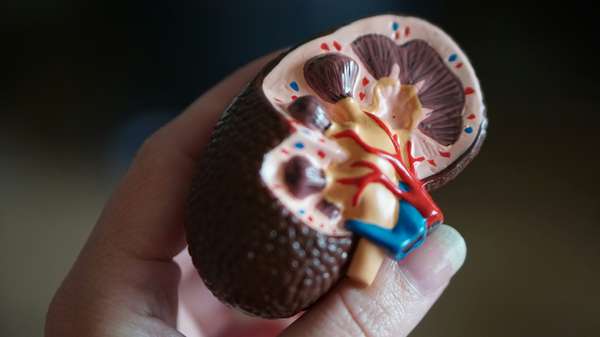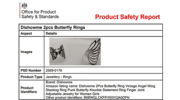
Kidney cancer cases are climbing sharply across Australia, with health experts warning that seemingly harmless recurring urinary tract infections might be your body's way of sounding an alarm about something much more sinister.
In 2022, it's estimated that 4,552 new cases of kidney cancer will be diagnosed in Australia, making it the seventh most commonly diagnosed cancer in the country. Even more concerning? Kidney cancer has shifted from being classified as a 'less common' cancer to a 'common' cancer between 2000 and 2024, with incidence rates expected to be highest for those aged 70-74 years.
What makes this cancer particularly treacherous is its nickname: the 'silent killer'. Unlike breast or bowel cancers, which have established screening programs, there's currently no national screening program for kidney cancer available in Australia. This means most cases are discovered purely by accident.
In this article
Australia's growing kidney cancer crisis
The numbers paint a sobering picture for Australian seniors. A person has a 1 in 65 (or 1.5 per cent) risk of being diagnosed with kidney cancer by age 85, with the average age at diagnosis being 65 years old. For men, the risk is even higher at 1 in 48 (or 2.1 per cent).
Globally, the situation is equally alarming. Kidney cancer affects an estimated 400,000 new cases annually worldwide, with mortality rates approaching 175,000 deaths per year. Current projections suggest incidence will continue increasing over the next decade.
The UTI connection you shouldn't ignore
Here's where many Australians might be missing crucial warning signs. Hazel Jackson, a lead nurse from Kidney Cancer UK, explains that recurring urinary tract infections are among the most overlooked red flags for kidney cancer.
'Though most UTIs are harmless, repeated infections can mask serious kidney problems, including, in rare cases, cancer'
Most people understand that a single UTI is usually nothing to worry about, particularly for women who are more prone to these infections. However, when UTIs keep recurring, your body might be trying to tell you something more serious is happening.
The challenge lies in the symptoms. UTIs typically cause a burning feeling when urinating, frequent urges to urinate with little output, and dark or cloudy urine. When these symptoms keep returning despite treatment, it's easy to assume it's just another bout of the same infection rather than a potential sign of kidney cancer.
UTI warning signs that warrant further investigation
Recurring UTIs that don't respond normally to standard treatment
UTIs that return shortly after completing antibiotics
UTI symptoms combined with blood in urine (even small amounts)
Persistent lower back or side pain alongside UTI symptoms
UTIs that occur more frequently than your normal pattern
The other crucial warning sign
The most significant red flag remains blood in your urine, which can appear in various forms. Jackson warns that any amount of blood in urine is abnormal and should trigger an immediate GP visit.
'Some people assume a small drop isn't worth worrying about, but in essence, any blood in your urine is abnormal and should be checked immediately,' Jackson explains. This blood might appear as deep red or brown urine, a pink tinge when urinating, or even just traces on toilet paper.
Rising rates among younger Australians
Perhaps most alarming is the trend affecting younger adults. Research shows that people born in 1990 are up to three times more likely to develop kidney cancer compared to those born in the 1950s. Kidney cancer is strongly contributing to cancer incidence increases for people in their forties, suggesting this disease is no longer just a concern for older adults.
Did you know?
What does this mean for you?
If you're over 60, you're entering the highest risk category for kidney cancer. However, the rising rates in younger people suggest this cancer is becoming more aggressive and widespread. The key is staying vigilant about symptoms and not dismissing recurring health issues as simply part of getting older.
Key risk factors for Australian seniors
Understanding your risk factors can help you stay alert to potential problems. The main contributors to kidney cancer include:
Modifiable risk factors:
- Smoking (responsible for up to one-third of all kidney cancers)
- Obesity and excess weight
- High blood pressure
- Limited physical activity
Non-modifiable risk factors:
- Age (risk increases with age, peaking at 70-74)
- Gender (men are twice as likely to develop kidney cancer)
- Family history of kidney cancer
- Chronic kidney disease
Your kidney cancer prevention checklist
- Quit smoking or don't start
- Maintain a healthy weight through balanced diet and exercise
- Monitor and manage blood pressure regularly
- Stay physically active within your capabilities
- Attend regular GP check-ups, especially if you have risk factors
- Never ignore blood in urine, regardless of amount
- Report recurring UTIs that don't respond normally to treatment
When to see your GP
Given that kidney cancers often don't cause symptoms in early stages, and sometimes cause very few symptoms even when they've grown extensively, knowing when to seek medical advice becomes crucial.
Book an appointment with your GP if you experience:
- Any amount of blood in your urine, even if it's just a trace
- Recurring UTIs, especially if they're becoming more frequent
- Persistent pain in your back or side that doesn't resolve
- UTI symptoms that don't respond to standard antibiotic treatment
- A combination of any of these symptoms
Remember, your GP would rather see you for a false alarm than miss something serious. With kidney cancer, early detection dramatically improves treatment outcomes.
The importance of advocacy
One of the most crucial lessons from kidney cancer statistics is the importance of self-advocacy. Since most cases are discovered accidentally during scans for other conditions, being proactive about unusual symptoms becomes vital.
Don't let age convince you to dismiss symptoms as 'just getting older'. The average diagnosis age of 65 means many Australian seniors are discovering kidney cancer right when they might be attributing symptoms to normal aging processes.
Treatment outlook when caught early
While the statistics around kidney cancer might seem frightening, there's reason for optimism when the disease is detected early. In most cases, the earlier that kidney cancer is diagnosed, the better the prognosis.
Modern treatment options have improved significantly, with surgical techniques becoming less invasive and targeted therapies offering new hope for advanced cases. The key is catching it before it spreads, which makes recognising those early warning signs—particularly recurring UTIs combined with other symptoms—absolutely crucial.
What This Means For You
The reality is that kidney cancer rates are climbing, particularly among people in their sixties and seventies. However, armed with knowledge about warning signs and risk factors, you're better positioned to catch any problems early.
If you've been experiencing recurring UTIs, don't let your GP brush them off as routine. Ask specifically about kidney cancer screening if you have multiple risk factors. Trust your instincts about your body—you know what's normal for you.
Most importantly, remember that while kidney cancer might be called a 'silent killer', it doesn't have to remain silent if you know what to listen for.
Have you or a loved one dealt with recurring UTIs or other urinary symptoms? How did your GP respond when you raised concerns about kidney cancer? Share your experiences in the comments below—your story might help another reader advocate for their health.
Original Article
https://www.dailymail.co.uk/health/...tml?ns_mchannel=rss&ns_campaign=1490&ito=1490
Kidney cancer in Australia statistics | Cancer Australia
Cited text: In 2022, it is estimated that 4,552 new cases of kidney cancer will be diagnosed in Australia (3,081 males and 1,471 females).
Excerpt: In 2022, it's estimated that 4,552 new cases of kidney cancer will be diagnosed in Australia
https://www.canceraustralia.gov.au/cancer-types/kidney-cancer/kidney-cancer-australia-statistics
Kidney cancer in Australia statistics | Cancer Australia
Cited text: Kidney cancer was the seventh most commonly diagnosed cancer in Australia in 2018. It is estimated that it will remain the seventh most commonly diagn...
Excerpt: the seventh most commonly diagnosed cancer in the country
https://www.canceraustralia.gov.au/cancer-types/kidney-cancer/kidney-cancer-australia-statistics
Cancer data in Australia, Overview of cancer in Australia, 2024—Australian Institute of Health and Welfare
Cited text: Cancers that changed from less common to common were bladder cancer, kidney cancer and pancreatic cancer.
Excerpt: Kidney cancer has shifted from being classified as a 'less common' cancer to a 'common' cancer between 2000 and 2024
https://www.aihw.gov.au/reports/cancer/cancer-data-in-australia/contents/overview
Kidney cancer in Australia statistics | Cancer Australia
Cited text: The incidence rate for kidney cancer is expected to increase with age, highest for those aged 70—74 years.
Excerpt: incidence rates expected to be highest for those aged 70-74 years
https://www.canceraustralia.gov.au/cancer-types/kidney-cancer/kidney-cancer-australia-statistics
Kidney cancer | Causes, Symptoms & Treatments | Cancer Council
Cited text: There is currently no national screening program for kidney cancer available in Australia.
Excerpt: there's currently no national screening program for kidney cancer available in Australia
https://www.cancer.org.au/cancer-information/types-of-cancer/kidney-cancer
Kidney cancer in Australia statistics | Cancer Australia
Cited text: In 2022, it is estimated that a person has a 1 in 65 (or 1.5 per cent) risk of being diagnosed with kidney cancer by the age of 85 (1 in 48 or 2.1 per cent for males ...
Excerpt: A person has a 1 in 65 (or 1.5 per cent) risk of being diagnosed with kidney cancer by age 85
https://www.canceraustralia.gov.au/cancer-types/kidney-cancer/kidney-cancer-australia-statistics
Kidney cancer | Causes, Symptoms & Treatments | Cancer Council
Cited text: The average age at diagnosis is 65 years old.
Excerpt: the average age at diagnosis being 65 years old
https://www.cancer.org.au/cancer-information/types-of-cancer/kidney-cancer
Global epidemiology of kidney cancer | Nephrology Dialysis Transplantation | Oxford Academic
Cited text: Nephrology Dialysis Transplantation, Volume 39, Issue 6, June 2024, Pages 920—928, https://doi.org/10.1093/ndt/gfae036 ... Luigi Cirillo, Samantha Inn...
Excerpt: Kidney cancer affects an estimated 400,000 new cases annually worldwide, with mortality rates approaching 175,000 deaths per year
https://academic.oup.com/ndt/article/39/6/920/7606319
Global epidemiology of kidney cancer—PubMed
Cited text: ... Kidney cancer (KC) is a disease with a rising worldwide incidence estimated at 400 000 new cases annually, and a worldwide mortality rate approach...
Excerpt: Kidney cancer affects an estimated 400,000 new cases annually worldwide, with mortality rates approaching 175,000 deaths per year
https://pubmed.ncbi.nlm.nih.gov/38341277/
Global epidemiology of kidney cancer | Nephrology Dialysis Transplantation | Oxford Academic
Cited text: Current projections suggest incidence continuing to increase over the next decade, emphasizing the urgency of addressing this significant global healt...
Excerpt: Current projections suggest incidence will continue increasing over the next decade
https://academic.oup.com/ndt/article/39/6/920/7606319
Global epidemiology of kidney cancer—PubMed
Cited text: Current projections suggest incidence continuing to increase over the next decade, emphasizing the urgency of addressing this significant global healt...
Excerpt: Current projections suggest incidence will continue increasing over the next decade
https://pubmed.ncbi.nlm.nih.gov/38341277/
Cancer data in Australia, Overview of cancer in Australia, 2024—Australian Institute of Health and Welfare
Cited text: Cancers strongly contributing to cancer incidence increases for the population in their forties are thyroid cancer, breast cancer, prostate cancer, co...
Excerpt: Kidney cancer is strongly contributing to cancer incidence increases for people in their forties
https://www.aihw.gov.au/reports/cancer/cancer-data-in-australia/contents/overview
Kidney cancer | Cancer Australia
Cited text: ... Kidney cancers often do not cause symptoms in the early stages of the disease, and sometimes cause very few symptoms, even if they have grown exte...
Excerpt: kidney cancers often don't cause symptoms in early stages, and sometimes cause very few symptoms even when they've grown extensively
https://www.canceraustralia.gov.au/cancer-types/kidney-cancer
Kidney cancer | Causes, Symptoms & Treatments | Cancer Council
Cited text: In most cases, the earlier that kidney cancer is diagnosed, the better the prognosis.
Excerpt: In most cases, the earlier that kidney cancer is diagnosed, the better the prognosis
https://www.cancer.org.au/cancer-information/types-of-cancer/kidney-cancer







